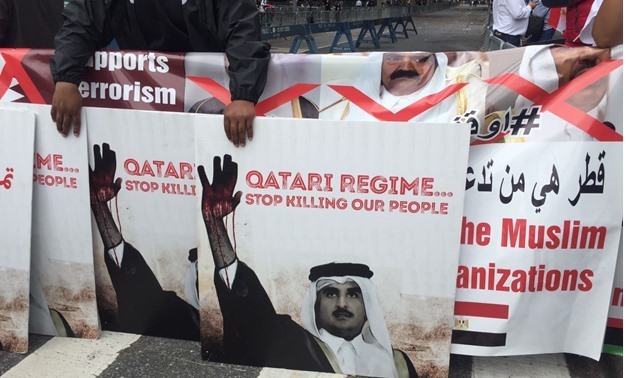
Anti-Qatar banners in protests outside the UN HQ in NY on Sept. 19, 2017 - Egypt Today
CAIRO – 10 March 2018: Besides being against the region’s stability and peace, the Qatari regime is as well growing more and more hypocritical and duplicitous.
On Wednesday, Qatari Emir Tamim Bin Hamad announced striking a controversial agreement with NATO on military cooperation. The agreement gives a carte blanche for the NATO forces to freely move inside the Qatari territories and put the U.S.-led Al-Udeid Air Base under their disposal.
Qatari regime touting lies:
In the alliance’s headquarters in Brussels, NATO Secretary General Jens Stoltenberg hosted Bin Hamad. “The two leaders discussed the security situation in the Gulf region and the partnership between NATO and Qatar,” stated NATO’s official website.
In many international clusters, Bin Hamad has constantly sniveled about how the four countries boycotting Qatar have curtailed its sovereignty, while it has been essentially sold to Turkey, Iran and most recently NATO.
“Qatari newspapers are quite discreet about the new accord, hailing it as merely a ‘cooperation agreement’ in an aim to promote the regime’s success in the face of the boycott,” the Emirati-led Dar Al Khaleej newspaper said in a report on Friday.
The report further cited experts who said such a move is another example of how Qatari sovereignty is being taken away under the rule of the current regime.
Under the title of “What the controversial Qatari Emir is doing in Belgium once again”, Belgium paper Le Vif said that the world’s youngest monarch is not a “natural character.”
The report also denounced claims that Belgium’s government has welcomed the Emir with “open arms”, who has been consistently and internationally accused of sponsoring and supporting terrorism in the region, adding, “Moreover, Doha has always sought closer ties with Iran, which prompted the four neighboring countries to sever diplomatic relations with Doha.”
“Due to Qatar’s lack of commitment to the Riyadh agreement signed in 2013, neighboring countries had to escalate the row with Doha,” it added.
The U.S.-based founding editorial board member at NATO's “Defense Strategic Communications” journal, Mitchell Waller, described NATO’s pact with Doha as insane.
“NATO should be doing nothing with the very regime that has financed Islamic subversion and terrorism against its member nations. We should be moving our military presence out of Qatar, not letting Qatar into ours,” he added.
Iran and Turkey increasing leverage in Qatar:
In November 2017, Qatari Ambassador to Tehran, Ali bin Ahmed Ali al-Sulaiti, who resumed his diplomatic duties from the Qatari embassy in Tehran last August, held meetings with Iranian officials.
Sulaiti held a meeting with Iranian Parliamentary Director-General for International Affairs Hossein Amir-Abdollahian. Sulaiti claimed that "his country has always had close relations with Iran," and described his country's relations with Iran as fraternal.
Since the Qatar crisis broke out in early June, Iran has taken advantage of the gap caused by the Arab boycott to boost ties with Qatar.
Qatari-Iranian relations can be divided into two stages. The initial stage was described as “alliance relations,” but during the current situation of the Arab boycott, these ties can be seen as “conspiratorial relations.”
Iran seems to take an indifferent stance to Qatar’s funding of Sunni extremist groups in Syria and Iraq that fight Iranian influence in the region, choosing instead to aid the Qatari emir during his country’s crisis to achieve economic and political gains.
According to the World Bank’s data, the Arab nation imported about $1 billion worth of foodstuffs in 2015, with about a third of that coming from Saudi Arabia and the UAE.
Mohammad Lahooti, chairman of the Iran Export Confederation, said the Qatari condition offered a unique opportunity for the Iranian economy. He asserted that Iran should take advantage of the current situation as soon as possible.
Meanwhile, Iran’s biggest confectionery company, Shirin Asal Food Industrial Group, is planning to enter the Qatari retail market. With a turnover of about $5 billion per annum, the group announced it was planning to set up a factory in Qatar. The company, which produces more than 1,000 products, conducted a four-month-long market study in Qatar and got encouraging feedback.
Additionally, Turkey announced that it is considering the deployment of naval and air forces and troops to Doha, Turkish Ambassador to Qatar Fikret Ozer told reporters at a press conference in Doha.
The deployment of the new troops will add to the troops that are already stationed in Doha. Ozer said the deployment of the troops is according to an agreement signed between Qatar and Turkey in 2014.
“Ankara and Doha would determine the timeline of the construction of the necessary infrastructure and when these forces will be deployed through talks,” he said.
Since June 5, Egypt, Saudi Arabia, Bahrain and the United Arab Emirates have turned on Qatar with a complete air and trade boycott over allegations of its support and sponsorship of terrorism, which Doha repeatedly denies.
Following the Arab boycott of Doha, a list of 13-demands was handed to Doha’s government by Egypt, Saudi Arabia, the UAE and Bahrain for reconciliation, which includes the closing of Al-Jazeera broadcasting and the suspension of its cozy relationship with Saudi arch-rival Iran.

Comments
Leave a Comment